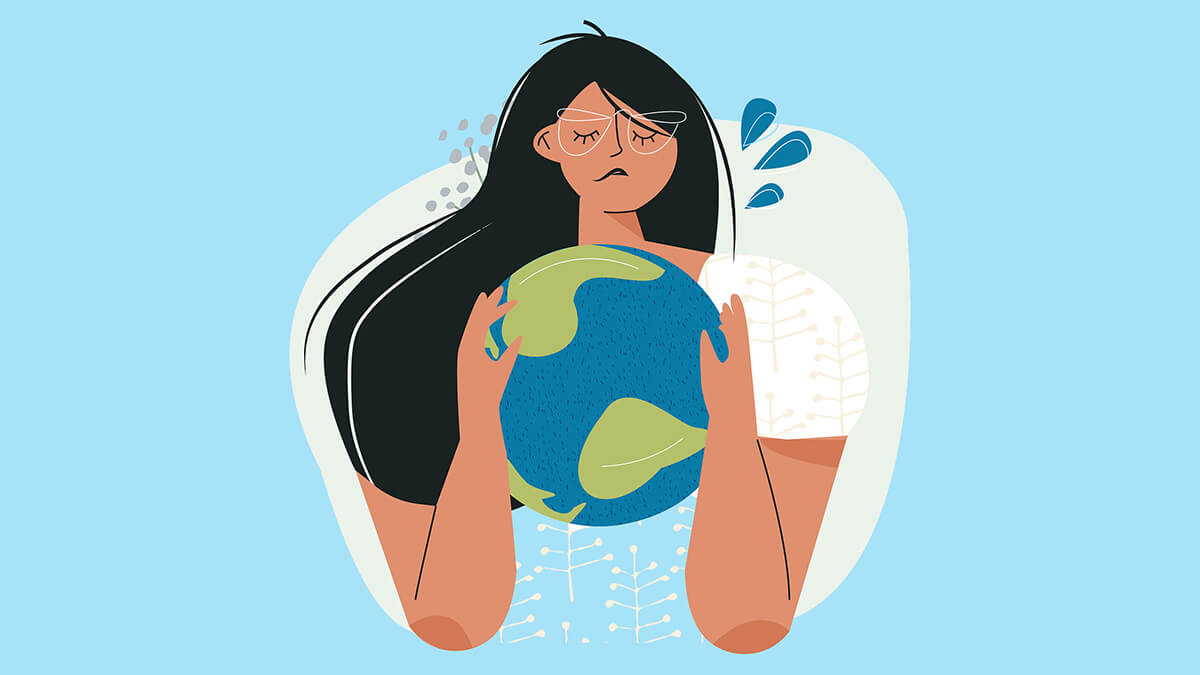Learn about the mental health consequences of climate change—and why resilience is critical.
The impacts of climate change are well known: warming oceans, melting glaciers, rising sea levels, severe storms and droughts, and increased heat waves. But negative effects on our mental health are another consequence of climate change. In a public opinion poll conducted by the American Psychiatric Association (APA) in 2019, 48% of respondents said it was definitely true or probably true that climate change is already impacting the mental health of Americans.1
Anxiety and ecoanxiety
According to the APA, “The mental health consequences of events linked to a changing global climate include mild stress and distress, high-risk coping behavior such as increased alcohol use, and, occasionally, mental disorders such as depression, anxiety, and post-traumatic stress.”2 The term “ecoanxiety” has been coined to describe the feelings of frustration and helplessness some people experience when contemplating climate change, and “ecoguilt” captures the feelings some people have when they think about the consequences of their own actions on future generations.3
Disasters and disorders
Additionally, victims of natural disasters such as floods and wildfires may experience depression, anxiety, and post-traumatic stress disorder. Some will even develop ongoing psychological illnesses, according to the American Psychological Association.4 And first responders, the homeless, the poor, people with pre-existing mental illness, children, and pregnant and postpartum women are all at a higher risk of experiencing mental health impacts from weather-related disasters.4
The impacts of increased heat
Rising temperatures are associated with an increase in suicides, dementia, and anxiety disorders.5 The American Psychological Association noted that the risk of disease and death among people with mental illness increases with increases in extreme heat. The association notes that medications are partially to blame because “many psychoactive prescription medications impair the body's ability to regulate temperature.”6
How resilience can help
Climate change is sometimes thought of as something that will happen in the future, but we’re experiencing its impacts—both physically and mentally—right now. Psychologists say that building resilience can help people prepare for, adapt to, and recover from the effects of climate change. Resilience is the process of adapting well to changes, including trauma, adversity, and tragedy. To build resilience, focus on these four components:
- Create connections—with individuals and groups—so you have access to support.
- Foster wellness by getting and staying fit and developing methods to handle stress, such as meditation, journaling, prayer, or yoga.
- Find purpose by taking action. Take small steps toward goals, be proactive, help yourself and others, and reflect on the ways you’ve grown.
- Embrace a healthy mindset by maintaining perspective, accepting change, adopting an optimistic outlook, and learning from your past.7
As individuals, we may not be able to control climate change, but we can be aware of its impacts on mental health, and we can take steps now to build resilience so we’re better prepared for the future.
If you’re fascinated by the impacts of the modern world on mental health, earning a psychology degree might be your goal. When studying psychology, you’ll learn more about the human mind and gain insights into human behavior that can help you help others. Online psychology courses make it particularly convenient for you to start your studies right away, allowing you to learn on your own schedule and in a location that suits your needs, as opposed to having to travel to classes on a campus at a particular time.
Walden University is an accredited institution offering online psychology degree programs, including a bachelor’s in psychology. Walden’s online Bachelor of Science in psychology degree program provides a broad overview of psychology and introduces you to multiple theories, perspectives, and approaches in the field. You can choose from a variety of concentrations so you can focus on the particular area of psychology that interests you most. Addiction, Criminal Justice, Forensic Psychology, Human Services, and Workplace Psychology are all concentrations you can choose from. If you want a broad education, you can select General Psychology as your concentration. If you’re certain you want to continue your studies and earn an MS in Psychology, you can choose Accelerate Into Master’s (AIM), which will allow you to earn up to 25 master’s-level credits at the undergraduate tuition rate.
The many concentrations offered by Walden can help equip you for jobs that are in demand upon completing your bachelor’s degree in psychology or lay the groundwork for an MS in Psychology, or even a PhD in Psychology.
Walden University is an accredited institution offering a BS in Psychology degree program online with several concentrations to help you meet your personal and professional goals. Expand your career options and earn your degree using a convenient, flexible learning platform that fits your busy life.
1Source: www.psychiatry.org/newsroom/apa-public-opinion-poll-annual-meeting-2019
2Source: www.psychiatry.org/patients-families/climate-change-and-mental-health-connections
3Source: qz.com/948909/ecoanxiety-the-american-psychological-association-says-climate-change-is-causing-ptsd-anxiety-and-depression-on-a-mass-scale/
4Source: www.apa.org/monitor/2016/07-08/climate-change
5Source: www.ncbi.nlm.nih.gov/pmc/articles/PMC4446935/
6Source: www.apa.org/monitor/2016/07-08/climate-change
7Source: www.apa.org/topics/resilience
Walden University is accredited by The Higher Learning Commission, www.hlcommission.org.




